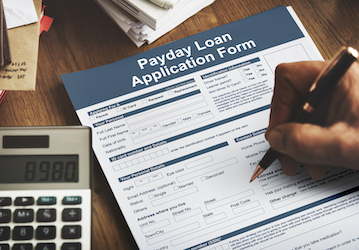If you find yourself in need of some quick cash, you might be considering a payday loan. Think again before you sign on the dotted line because you could end up owing 10–30% or more than the loan itself—and be on the hook for even more if you fail to pay it back on time. You probably have access to cheaper options too.
How payday loans work
Payday loans are high-cost, short-term loans of small amounts of money, usually $500 or less, that you can get online or in shops nationwide. Many payday lenders require that the funds be repaid when you get your next paycheck—usually within 2 weeks. Most payday lenders charge high interest or a flat fee in order to get around any state limitations on interest rates. (Some payday loans are considered “predatory” when the terms of the loan are unclear, unfair, or deceptive.) By taking a payday loan, you could end up paying much more than the amount you originally borrowed. Fees often range from $10 to $30 for each $100 you borrow. So, if you get a payday loan for $300, you could owe $330 to $390 or more.
It can be tempting to get a loan to cover expenses those last few days before payday, but often the cost isn’t worth it.
What’s worse, if you can’t pay off the loan when it’s due, you could end up owing even more in late fees. Unpaid loans can be sent to collection agencies, which can impact your credit score and ability to borrow money in the future. Also, many lenders require your bank account information and include language in the loan paperwork that allows them to withdraw money directly from your account to repay the loan. (If you don’t have enough money in your account, you could get charged an overdraft fee by your bank too.)
It can be tempting to get a loan to cover expenses those last few days before payday, but often the cost isn’t worth it. Service Members use them roughly 3 times more than civilians, so you might notice lots of payday loan stores near your base or other areas you spend time. Before heading inside, you might want to explore other financial resources.
Help is out there
Whether you or a friend are already in a bit of payday-loan trouble, or you just want to find ways to avoid the situation, there are many resources that can help.
- Find out if you’re eligible for an interest-free loan through a military relief organization. Typically, they provide emergency financial assistance for expenses such as healthcare, food, rent or mortgage, and minor home repairs.
- Speak with a financial counselor (outside your chain of command) about negotiating late fees and payment plans. Tip: Ask about savings, retirement, and investment-plan options too.
- Take a free financial readiness course or financial wellness course to learn more about budgeting, saving, and planning for the future.
- Build up an emergency fund by putting $20, $50, or $100 per paycheck into a savings account. It’s a good idea to have 6 months’ worth of your salary set aside for emergencies.
- Visit the federal Consumer Financial Protection Bureau website to learn your rights under the Military Lending Act.
Bottom line
Many people face money troubles at some point in life. But ignoring financial problems can suggest poor judgement, which can put your career at risk and limit your chances for special-duty or PCS assignments, technical schools, promotions, and even security clearances. So, get help and professional advice early on and as often as you need it.
